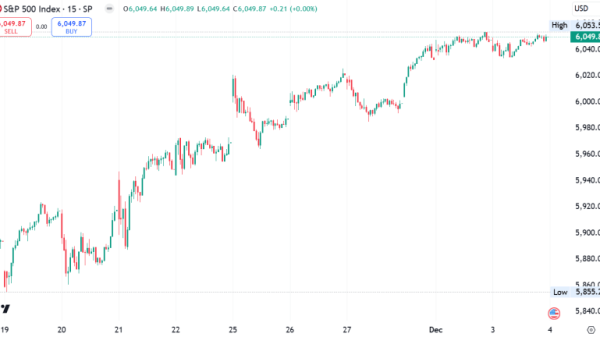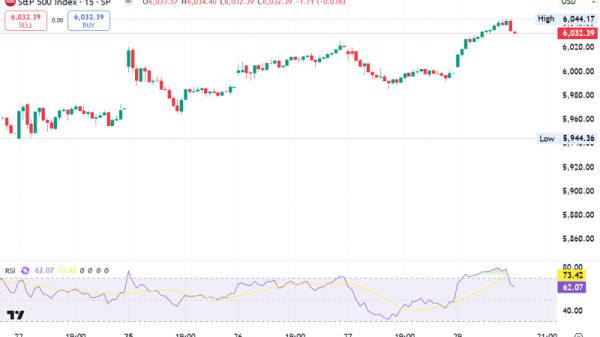By Lewis (JO:LEWJ) Krauskopf
(Reuters) – With Donald Trump heading back to the White House, Wall Street is anticipating the potential for lower taxes, deregulation and a U.S. president who is quick to sound off on everything from the stock market to the dollar.
Trump made tariffs and tax cuts key elements of his pitch to voters, many of whom said the economy was the biggest issue of the election. Another important plank of his platform is expected to be deregulation in areas ranging from the banking industry to cryptocurrencies.
The promise of those policies appears to have already stirred prices for some assets, including the dollar, shares of regional banks and the price of bitcoin.
For a Trump administration, “markets are basically thinking it’s pro-growth, even if it comes with higher inflation and higher interest rates,” said David Bianco, Americas chief investment officer at DWS Group.
Edison Research projected on Wednesday that Trump had secured more than the 270 Electoral College votes needed to win the presidency.
While political developments can move markets, investors say they typically tend to take a back seat to macroeconomic forces and the health of corporate profits as well as global events.
For example, the S&P 500 rose nearly 70% during Trump’s first term as technology shares soared, even as his tariff policies sparked bouts of volatility. Meanwhile, the energy sector notched deep losses after global economies were paralyzed by the COVID-19 pandemic, although his administration was friendly to fossil fuel development.
HISTORY NOT A GUIDE?
Trump’s election in 2016 sparked a so-called reflation trade, with investors piling into an array of assets such as copper futures and shares of construction companies on the belief that tax cuts and other stimulative policies would boost sluggish U.S. economic growth.
But the economic landscape has changed, and some investors believe the moves of 2016 may not offer an accurate roadmap for how stocks, bonds and the dollar might trade in coming months.
The U.S. economy grew by an annualized rate of 2.8% in the third quarter of 2024, compared to just below 2% in 2016. And while months of restrictive monetary policy have helped tamp inflation down from four-decade highs hit in 2022, some investors worry tariffs or tax cuts could send consumer prices higher again. By contrast, sluggish inflation and growth were concerns for the Fed eight years ago.
Signs of rebounding inflation could also cause a rethink of the Federal Reserve’s interest rate trajectory, with the central bank just beginning to ease monetary policy after hiking rates to bring inflation down from 40-year highs.
And while the last weeks of the 2024 presidential race saw betting markets move in favor of Trump over his opponent, Kamala Harris, his 2016 victory “was a general surprise, the positive market reaction was a surprise too, and the investor positioning in the runup to elections was for a disinflationary backdrop,” JPMorgan strategists wrote on Monday (NASDAQ:MNDY).
TARIFFS AND TAX REFORM
The potential implementation of tariffs – which Trump has vowed to increase by 10% on imports, and 60% on goods from China – could make a key difference in how investors approach asset markets in coming months.
A study by Deutsche Bank (ETR:DBKGn) said a Trump victory would add about half a percentage point to U.S. gross domestic product if tariffs are not implemented. Tariffs would subtract about a quarter of a point from GDP, the study found.
“There are still going to be some question marks as to how aggressive Trump does go with tariffs, and that’s going to be a story regardless of the composition of Congress, given that can be pushed through via executive action,” said Garrett Melson, portfolio strategist at Natixis Investment Managers.
Trump also wants tax reform, including reducing the corporate tax rate to 15%, for those companies that make their products in the U.S., after having cut the rate to 21% from 35% during his 2017-2021 presidency.
Such tax cuts – which will need to pass Congress – could support company earnings and sentiment for stocks, although the extent of such a boost remains to be seen.
Cutting the rate to 15% would boost S&P 500 earnings by about 4%, according to estimates by Goldman Sachs strategists.
“In the shorter term, equity investors will look upon favorably a Trump victory because the potential for him” to extend current tax cuts, said Jake Seltz, portfolio manager with Allspring Global Investments.
At the same time, broad tax cuts could spark concerns about adding to U.S. debt when investors are becoming increasingly focused on the federal deficit. Deficit worries have helped spark a recent selloff in U.S. government debt, taking the 10-year Treasury yield, which moves inversely to bond prices, to 4.471% on Wednesday, its highest level since July.
Trump’s tax and spending plans would increase the debt by $7.75 trillion over the next decade, according to an Oct. 28 estimate from the Committee for a Responsible Federal Budget, a budget-focused think-tank.
An added wrinkle is Trump’s penchant to speak on a wide swath of potentially market-moving topics, demonstrated during his first term when he frequently commented on everything from the strength of the dollar to trade to the policies of individual companies. Those remarks occasionally sparked asset price moves.
“Markets are a little on edge about the idea that a Trump administration will come with a lot of communication that will be difficult to separate the noise from signal,” said DWS Group’s Bianco.




































